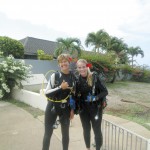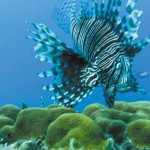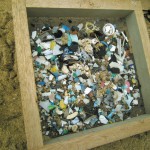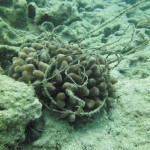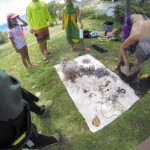Earth/Sky/Mauka/Makai
CONSERVING THE ISLAND, FROM TREES TO SEAS
As a young scuba diver, Gracie Pillons loved discovering unusual creatures underwater. But as she got older, Pillons began to notice a different aspect of the ocean during international diving trips: The water was filled with marine debris.
“In the Cayman Islands, there’s a beautiful reef, but there is a lot of destruction and trash,” she says. “And in the Philippines, (the marine debris) was really bad.”
Growing up in Wyoming, Pillons began diving at age 10 — and by the time she was 18, she was a certified dive master. While attending University of Hawaii, she worked as a dive instructor and noticed a lot of those same problems in the Islands as well — particularly how people are affecting the reef through overuse and negligence.
- Trees To Seas vice president Liv Wheeler (left) and president Gracie Pillons PHOTOS COURTESY TREES TO SEAS
- Trees To Seas’ Liv Wheeler also launched a lionfish removal program in Belize
- Some of the plastics that Trees to Seas pulled out of the water on a recent cleanup dive
- An example of some of the trash that Trees To Seas removes during its dives
- The group evaluates the day’s trash and marine debris collection
Pillons, alongside fellow dive instructor Liv Wheeler, decided to start a group that combined ocean conservation with education. In 2013, the pair launched Trees To Seas, which hosts monthly cleanup dives, conducts international research and trains new divers. The group also has an affiliated chapter at UH.
“The goal is to create opportunities for students or even adults to get exposed to how we are directly affecting our environment,” Pillons explains. “We are just trying to spread awareness in a fun way.”
“I believe in how awareness can spread through people,” Wheeler adds. “The ocean is a shared resource. But if some people are not taking care of it … then the many don’t get to enjoy it anymore.”
During Trees To Seas’ monthly cleanups, they discuss issues such as marine debris, coral health and invasive species — and teach participants how to identify these things. Then, divers go at their own pace to remove debris, trash and invasive species — plastic bottles and microplastics are among chief concerns — from the area. When they get out, there’s a barbecue waiting for them.
Cleanup sites have included the waters off Malaekahana Beach, Ala Moana Beach Park and Portlock. So far, they have been focusing on South-side beaches, which Pillons says are susceptible to degradation because of heavy usage and tourist activity.
“We’ve pulled out things like huge engines, tires — all of this stuff that is coming straight out of (the ocean),” Pillons says.
The cleanups draw about 20 participants monthly and are open to the public — but divers must be certified and experienced in order to participate. If you’re not, Trees To Seas offers a conservation-focused certification program, Certs For A Cause.
The group’s research component, which Wheeler spear-heads, includes investigation into reef and marine issues around the world — including Belize, Jamaica and Bali, where Wheeler has visited for her day job as a diving safety technician at UH. On a recent trip to Belize, for example, Wheeler studied sea urchins in relation to reef algae.
While it has 501(c)3 status, Trees To Seas remains largely an after-hours operation. Like Wheeler, Pillons also has a full-time job, as a science teacher at Kailua Intermediate School. (Even there, Pillons never stops thinking about the ocean — she started a marine biology club at the school.) But the co-founders have plans to ramp up Trees To Seas programs. Wheeler is working to launch Palolo Stewardship Program, which raises community awareness about the amount of trash generated and organizes neighborhood cleanups.
“Whatever we (dispose of) at the top of Palolo Valley is going to end up in the water,” Pillons explains.
They also are in the planning stages for a summer diving camp — which is Pillons’ pet project and one of the main reasons she wanted to start Trees To Seas. They hope to launch the camp in 2015.
While a large part of Trees To Seas involves experiential conservation, the crux of the group is wider than that — it aims to extend its reach and raise awareness to those who may not want to get in the water. After all, the co-founders stress, everyone contributes to the health of the ocean. It’s something that they both have seen firsthand.
“I observe how the reefs are being destroyed … and also see how disrespectful we are with our waste. I see all kinds of trash out (in the ocean) — needless trash coming off of the land, (fishing) lines and plastic bags,” Wheeler says. “It haphazardly covers coral and then starts to get sediment on it and produce algae, and then that coral is dead, needlessly.”
Trees To Seas’ dives are held on the last Saturday of each month. There will not be a dive for December; the next one will be in January.
For more information about Trees to Seas, visit treestoseas.org.

